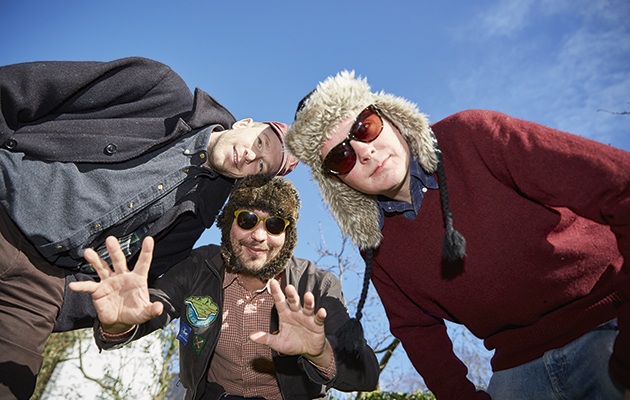Just before Christmas, I reviewed The Wave Pictures’ excellent Look Inside Your Heart, a raw, vibrant record that moves from the bluesy garage of “House By The Beach” and the chooglin’, stately “Hazey Moon”, to the Dylan-esque storytelling of “Tell Me That You Weren’t Alone”. I spoke to the band’s singer and guitarist David Tattersall for the accompanying Q&A, but 220 words didn’t quite do justice to our extensive chat. Here’s the full thing, featuring David’s thoughts on songwriting, the band’s career and the route to happiness…
____________________________
The snippets of other takes sprinkled throughout Look Inside Your Heart are really unusual. How did they come about?
When we got the rough mixes, Laurie [Sherman, engineer] had just chopped it roughly, and we liked it. There’s something about tape that’s really tactile, just something nice about those rough edits and the other sounds that are on the tapes. There’s a little bit of a track that we were taping over, because there’s only so many tape reels, so you record and then you dump the tape reels onto a computer. So there’s no recording done with the computer, but there’s a limited number of tape reels. So you get those nice chops and things. It was just a decision to not clean it up, it was good the way it was. You always get that, and before we topped and tailed it, but it just sounded good this way – there’s something about a tape machine in that room.
What’s the Booze Cube studio like?
It’s not a proper studio, it’s just a room. You can more have a party when you go in there, there’s no glass partition and there are no professionals around. You can go much later into the night, so we did Brushes With Happiness in the nighttime rather than in the daytime to be more relaxed. And Look Inside Your Heart was kind of like a party – there was even more of the tape machine, you had even more of a room feeling in the experience of making it. Laurie bought an old reel-to-reel tape machine and wanted to learn how to record it. So first of all we did Brushes With Happiness for him to practice. I wanted to do a totally improvised record, so we did that, but then we decided to release it. Then we had a whole other album, which would have been our [proper] album, we had 20 or 30 songs for that, so we were so happy we went back in again and did Look Inside Your Heart. It wasn’t a plan to do two albums, although once I realised that that’s what we had, I wanted to do two albums on one day! But the label wanted to stagger it a bit. I thought that would be the ultimate show-offy thing to do!
How long were you recording there for?
I think we did two sessions, so two days. We like to be very quick, spontaneity’s a big part of what we’re hoping to get. And also a little bit of vulnerability. So it’s not necessarily desirable to spend longer when those are the things that you treasure, I suppose. There are things that we’ve taken longer over, but they weren’t necessarily better – there’s something about that when you get something then move on to the next thing and start writing again and record something new, and just keep going, rather than just spend ages trying to polish it up. I suppose partly it’s because I don’t like that kind of music, and never have responded to it really, as much as other people seem to, and partly because I think it’s nice just to show what you really are. There’s a sort of arrogance to it, polishing up everything. I’d rather listen to field recordings or live albums or garage-rock or blues – we’re all that way, we like it rough and ready. Now a tremendous amount of thought might have gone into the lyrics or the music – we’re always talking about music constantly, and gigging all the time, refining what we do – but it doesn’t necessarily mean you want to kill a song by constructing it in a baroque way. You do a lot of thinking, but you go quite fast when you record. That’s what we enjoy.
It’s nice to hear mistakes on records, but I guess it’s hard to leave your own mistakes on…
A lot of records that I like a lot have a lot of mistakes on them, but you never want your own mistakes… so as quickly as possible I try to think, ‘What would I think if I heard this and it was somebody else?’ It’s preferable to embarrass yourself in that way than to go the other way. Not to compare us to Bob Dylan, but the spontaneity with which he made his albums is a part of why they’re so fresh. Of course you can’t copy the part where he’s just a genius, but…


